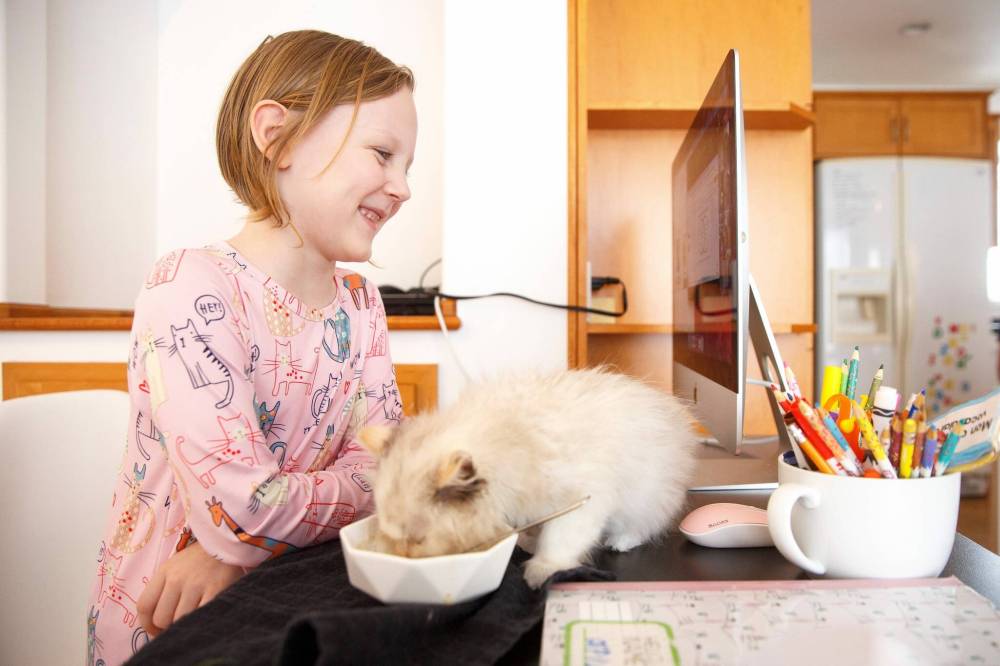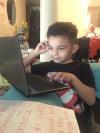Keeping it virtual: parents rush to remote
Online learning program sees surge in sign-ups
Advertisement
Read this article for free:
or
Already have an account? Log in here »
To continue reading, please subscribe:
Monthly Digital Subscription
$0 for the first 4 weeks*
- Enjoy unlimited reading on winnipegfreepress.com
- Read the E-Edition, our digital replica newspaper
- Access News Break, our award-winning app
- Play interactive puzzles
*No charge for 4 weeks then price increases to the regular rate of $19.00 plus GST every four weeks. Offer available to new and qualified returning subscribers only. Cancel any time.
Monthly Digital Subscription
$4.75/week*
- Enjoy unlimited reading on winnipegfreepress.com
- Read the E-Edition, our digital replica newspaper
- Access News Break, our award-winning app
- Play interactive puzzles
*Billed as $19 plus GST every four weeks. Cancel any time.
To continue reading, please subscribe:
Add Free Press access to your Brandon Sun subscription for only an additional
$1 for the first 4 weeks*
*Your next subscription payment will increase by $1.00 and you will be charged $16.99 plus GST for four weeks. After four weeks, your payment will increase to $23.99 plus GST every four weeks.
Read unlimited articles for free today:
or
Already have an account? Log in here »
Hey there, time traveller!
This article was published 12/01/2022 (1435 days ago), so information in it may no longer be current.
FACING a return to classroom learning amid a surge in COVID-19 cases, families are registering for indefinite remote learning at Manitoba’s virtual school.
Nearly 30 new students have signed up to join remote classrooms this month via the Manitoba Remote Learning Support Centre, which was created 12 months ago to primarily support K-8 students with underlying medical conditions and immunocompromised housemates.
Principal Andrew Mead has been keeping busy fielding requests in recent days.

“Basically, if there’s a wellness need, we are happy to support a child. We just know there’s lots of kids in a tough spot. Anxiety is through the roof for a lot of our kids and that limits their ability to attend a brick-and-mortar school,” said Mead, noting the virtual model has allowed educators to meet diverse student needs and circumstances.
One year ago, the provincial distance education hub launched through the St. James-Assiniboia School Division to provide an alternative to daily face-to-face lessons and support for sudden e-learning transitions, including mental health resources, amid the pandemic.
The one-stop-shop for remote resources (www.mbremotelearning.ca) initially garnered much criticism — from the teachers union and parent council association included — because of how long it took to set up and the fact spots were limited, among other reasons.
Since then, it has become the sole option for teacher-led remote instruction for many public school students as divisions have discontinued local options due to funding shortfalls. It has also made a name for itself as a way to access high-quality English and French immersion education at home.
“It’s really amazing, being able to feel safe in our home, knowing that (my Grade 2 daughter) is getting a great education. She has a great support system through her school. It’s a really big relief, as a mother. It’s emotional,” said Sarah Smith, a mother of three in Winnipeg, who enrolled her eldest in the centre in September.
One of her younger children has a heart defect that puts them at a higher risk of complications, if they were to contract SARS-CoV-2.
Medical appointments aside, the family has been isolated in their Windsor Park home since March 2020; Smith is currently a pregnant, stay-at-home parent and her husband works remotely. (Last year, daughter Piper studied via Louis Riel School Division’s virtual school.)
While noting her family is privileged to accommodate the setup and the early days of e-learning often involved frustration and crying, Smith said she now witnesses daily how engaged her daughter is in her studies and making friends online. Sometimes, Piper’s siblings listen-in on her teacher’s songs and French storytime.
In addition to live academic courses and independent study, remote students can partake in extracurriculars, including specialty clubs focused on phys-ed, ukulele and student voice. Virtual assemblies and recess also builds a community atmosphere, despite the fact participants may never meet each other in-person.
There are approximately 350 students enrolled in the hub, although that figure fluctuates. It is staffed by 28 teachers, six educational assistants and a little more than a half-dozen support staff.
Some of the certified teachers work remotely from across the country and the United States — in part, because the centre has had trouble hiring local teachers, who are in high demand.
Grade 3 teacher Mike Chopeck, who applied to the centre in 2020 because an autoimmune condition prevented him from returning to a physical classroom, indicated the key to remote learning is to make clear expectations around everything from raising hands and using microphones early on.
Last week, when hub teachers provided colleagues doing emergency remote learning from Jan. 10-15 with advice, Chopeck spoke about the importance of focusing on relationship-building and social interaction during e-learning, which he facilitates by using breakout rooms on the Microsoft Teams platform so his students can engage in smaller groups.
The centre runs on three key tenets: community-building; efficacy — or, ensuring children feel competent and are building “internal grit”; and student autonomy in learning.
Citing problem-solving with devices and virtual programs, the principal said remote learners are gaining new skills they would not typically practise in a traditional classroom.
“Every one of our kids is using technology in a positive way. They’re using it to build stuff. They’re using it to make stuff. They’re using it to connect with people,” said Mead.
Smith said her eldest child has become “a total self-starter” because she’s been forced to do work independently. The overall experience has made her consider keeping all of her children in remote education in a post-pandemic world.
“I get it won’t be the perfect fit for every kid,” added the Winnipeg mother, “but the fact that it’s a safe fit, it trumps everything else.”
Manitoba has budgeted $5 million for the centre in 2021-22.
maggie.macintosh@freepress.mb.ca
Twitter: @macintoshmaggie

Maggie Macintosh reports on education for the Winnipeg Free Press. Funding for the Free Press education reporter comes from the Government of Canada through the Local Journalism Initiative.
Our newsroom depends on a growing audience of readers to power our journalism. If you are not a paid reader, please consider becoming a subscriber.
Our newsroom depends on its audience of readers to power our journalism. Thank you for your support.
History
Updated on Wednesday, January 12, 2022 5:51 AM CST: Adds subheadline








